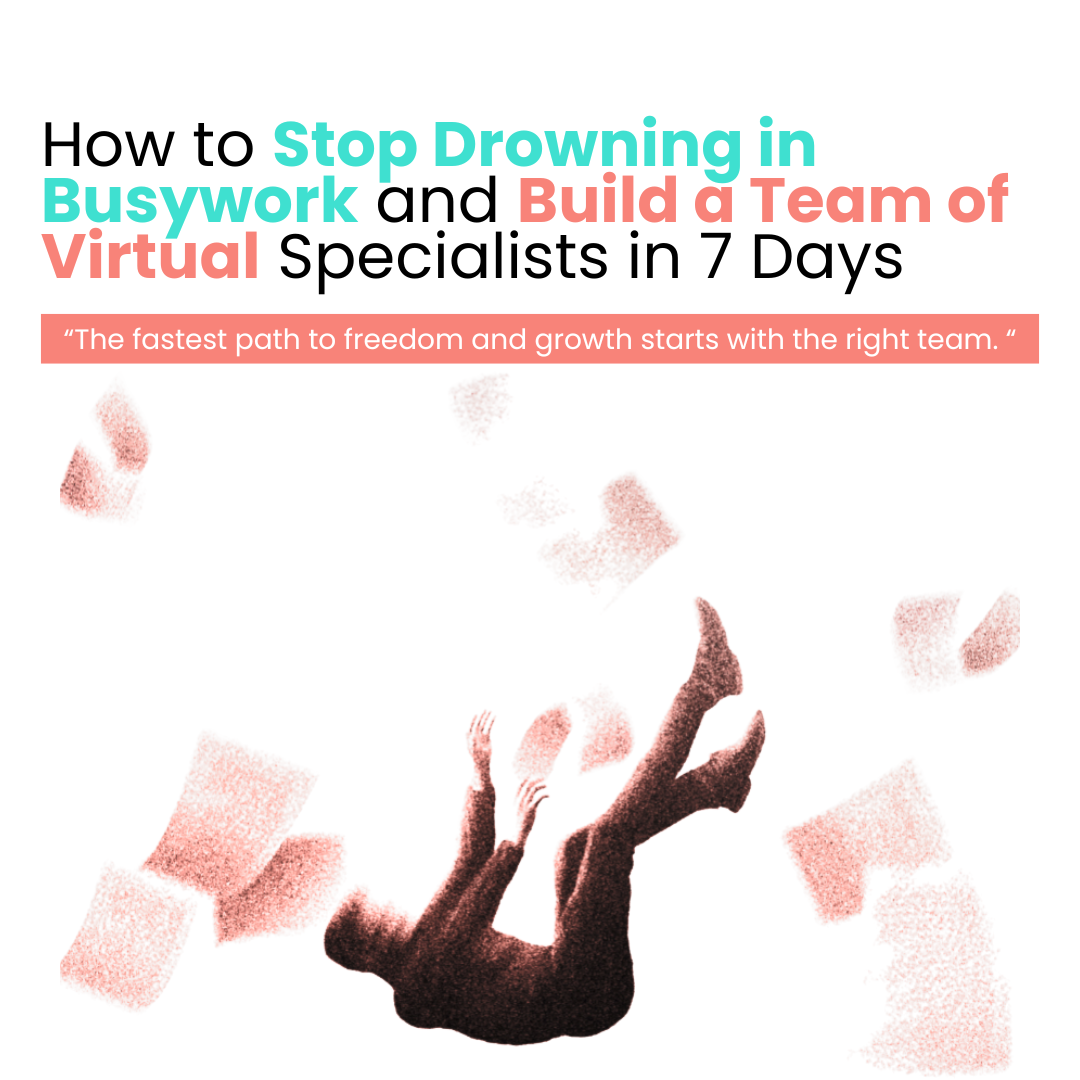How to Choose A Virtual Assistant For Your Business
In an era where businesses and entrepreneurs are constantly juggling multiple tasks and responsibilities, the need for efficient support has never been greater. Hence, there is a high demand for virtual assistants.
Virtual assistants are skilled professionals you can tap to provide remote assistance in various aspects of your personal and professional life. However, the success of your partnership with a virtual assistant hinges on selecting the right fit for your unique needs.
To help you make an informed decision, let's explore the steps involved and the questions you should ask during the hiring process in order for you to find the perfect VA.
Related Article: How To Find And Hire A Virtual Assistant For Your Business
DELEGATE SMART. SCALE FAST.
The step-by-step guide to reclaim your time and grow with confidence.
1. Assess Your Needs
Before diving into the search for a virtual assistant, take a moment to evaluate your requirements. Create a list of tasks or projects you want to delegate. Consider both short-term and long-term objectives. Having a clear understanding of your needs will guide you in finding a VA with the appropriate skill set.
2. Identify Essential Skills
Different virtual assistants possess different skill sets. Some are proficient in administrative tasks such as email management and appointment scheduling, while others excel in creative endeavors like content writing or video editing. Identify which skills are crucial for your tasks and focus your search accordingly.
3. Determine Experience Level
The complexity of your tasks may dictate the level of experience you require in a virtual assistant. Some VAs are generalists who can handle a broad array of tasks, while others specialize in particular fields. Decide whether you need a seasoned VA or are open to working with someone who is relatively new to the industry.
4. Establish Communication Preferences
Effective communication is vital when working with a virtual assistant. Determine your preferred communication channels and frequency. Some VAs are comfortable with regular video calls, while others may prefer written communication. Aligning communication preferences can enhance collaboration.
Related Article: Communication in Virtual Teams: Best Practices That Work Effectively
5. Consider Time Zones and Availability
Take into account your time zone and the hours during which you require your VA's support. If your tasks demand immediate attention during your working hours, it's essential to find a VA who can accommodate your schedule. Conversely, if your tasks can be completed asynchronously, you have more flexibility in your search.
6. Request References and Testimonials
Ask potential VAs for references or testimonials from previous clients. This will provide insights into their work ethic, reliability, and the quality of their work. Don't hesitate to contact references to gather more information.
Related Article: Testimonials From Previous Clients
7. Define Contract Terms
Once you've identified the right VA, make sure the contract clearly outlines the terms of your working relationship. This should encompass payment terms, deliverables, deadlines, and any other pertinent details.
8. Set a Realistic Budget
Establish a budget for your virtual assistant. Determine how much you're willing to pay per hour or per project. Keep in mind that rates may vary based on factors such as experience, expertise, and location.
Questions to Ask Your Potential Virtual Assistant During Interview
After narrowing down your list of virtual assistants, conducting interviews is a crucial step in the selection process. The following questions can help you assess a candidate's suitability:
Question 1: Can you describe your experience as a virtual assistant?
This question provides insight into the VA's background and helps you gauge their overall suitability.
Question 2: What types of tasks or projects have you worked on in the past that are similar to what I need?
Understanding their past experience in tasks similar to yours can reassure you of their capability.
Question 3: What is your preferred communication style and frequency?
Aligning your communication expectations is essential for a successful working relationship.
Question 4: How do you handle multiple tasks and prioritize them?
This question assesses their organizational and time management skills, which are crucial for a virtual assistant.
Question 5: Are you comfortable with the tools and software I use in my work?
Ensuring compatibility with your tech stack can streamline the onboarding process.
Question 6: Can you provide references from previous clients?
Contacting references can provide valuable insights into the VA's work ethic and reliability.
Question 7: How do you handle confidential information and maintain security?
If your tasks involve sensitive data, this question is vital to ensure the VA follows proper security measures.
Question 8: What are your availability and working hours?
Confirm that their availability aligns with your needs and time zone.
Question 9: What is your preferred method for tracking and reporting progress on tasks?
Discussing task tracking and reporting helps establish transparency in the working relationship.
Question 10: What would you do if you were unable to complete a task or project on time?
Assess their problem-solving skills and ability to communicate proactively in case of challenges.
Where to Find a Virtual Assistant?
Now that you know what to look for in a virtual assistant and have interviewed potential candidates, it's time to explore where you can find the right VA for your needs. Here are some common avenues:
Virtual Assistant Agencies
Virtual assistant agencies specialize in connecting clients with experienced VAs. They typically have a roster of pre-vetted VAs with various skill sets. Agencies can help match you with a VA who meets your specific requirements, saving you time in the hiring process.
SMART VAs is a reputable virtual assistant agency that offers a unique approach to providing virtual assistants. They provide not only one individual VA but also the option to assemble a dedicated team of virtual assistants tailored to your needs. The bonus is you only have to subscribe to a single plan to avail a team of VAs.
Team of Experts: SMART VAs offers a diverse pool of talented virtual assistants with various skills and expertise. You can select individuals with the specific skills required for your projects.
Scalability: As your business grows or your project requirements change, SMART VAs allow you to easily scale your team up or down. This flexibility is invaluable for businesses with fluctuating workloads.
Collaborative Tools: SMART VAs often include collaborative tools and project management software to facilitate communication and task tracking within your virtual team. They use Teamwork as their productivity tool to efficiently streamline tasks.
Quality Assurance: SMART VAs have quality assurance mechanisms in place to ensure that you receive high-quality work from your virtual team. Their VAs have regular upskilling sessions to improve on their craft. You will also get a respective project manager to make sure that every task or project you have will be taken care of efficiently.
When you choose a VA Agency like SMART VAs, you can access a pool of highly skilled virtual assistants while benefiting from the platform's tools and support for efficient collaboration.
Freelance Platforms
Freelance platforms such as Upwork, Freelancer, and Fiverr are popular places to find virtual assistants. These platforms offer a diverse range of talent, allowing you to review profiles, portfolios, and client feedback. You can post your job listing and receive proposals from interested VAs.
Networking
Leverage your professional network to find virtual assistants. Ask for recommendations from colleagues, friends, or business associates who have experience working with VAs. Personal referrals can be a valuable way to find trusted candidates.
Online Communities and Forums
Online communities and forums dedicated to virtual assistants and remote work can be excellent resources for finding VAs. Websites like Reddit and LinkedIn have dedicated groups where you can post job listings and connect with potential candidates.
Social Media
Platforms like LinkedIn, Facebook, and Twitter can also be useful for finding virtual assistants. You can post job listings on your profile or in relevant groups, or you can directly reach out to VAs who showcase their skills and services on social media.
Conclusion
Smart Virtual Assistants
👍🤵
Smart Virtual Assistants 👍🤵
Choosing the right virtual assistant requires careful consideration of your needs, preferences, and budget. By asking the right questions during the interview process and exploring various avenues for finding VAs, you can successfully identify the perfect virtual assistant or team of virtual assistants to support your personal and professional endeavors. Whether you opt for traditional freelance platforms or virtual assistant agencies like SMART VAs, a well-chosen VA can greatly enhance your productivity and work-life balance.
HOW MANY HOURS ARE YOU WASTING?
See how successful CEOs save 40+ hours a month by building a Smart VAs team.
Frequently Asked Questions
-
Deciding whether to hire a virtual assistant (VA) hinges on a range of factors like task load, budget, and business objectives. VAs excel in handling repetitive, time-consuming tasks like email management, data entry, and research. A cost-benefit analysis is vital, weighing the potential savings and enhanced productivity against the VA's rates.
Scalability is a plus, as VAs can be engaged part-time or as needed, adapting to fluctuating workloads. If your business needs specialized skills in areas like social media, content creation, or customer support, a VA with expertise can be a valuable asset.
By delegating non-core tasks, you can focus on strategic growth. Consider your business's stage, communication capabilities, trust in confidentiality, trial periods, technology tools, and legal compliance when making your decision. Again, hiring a virtual assistant can be a strategic move for businesses looking to boost efficiency and concentrate on core tasks. However, a thoughtful assessment of your specific needs and circumstances is crucial to determine if a virtual assistant aligns with your business goals. -
A virtual assistant (VA) can offer a wide range of essential services to small businesses, including administrative tasks like email and calendar management, data entry, and travel arrangements. They mostly excel in customer support by responding to inquiries, managing complaints, and providing product or service information.
VAs also play a vital role in social media management, content creation, marketing, and online research. Moreover, they can also handle bookkeeping and financial tasks, project management, email marketing, e-commerce support, technical assistance, personal tasks, language translation, and even event planning.
The specific services depend on the VA's skills and the business's needs, making them a cost-effective solution for delegating tasks and freeing up time for core business activities. That said, hiring a virtual assistant can significantly enhance a small business's efficiency and effectiveness, enabling it to focus on growth and success while leaving time-consuming responsibilities in capable hands. -
Training and onboarding a virtual assistant starts with preparing clear documentation of your workflows, preferred tools, and expectations. Provide step-by-step guides for recurring tasks and give your VA access to essential platforms like email, project management tools, or CRM systems. Schedule an initial onboarding call to walk them through processes, introduce your brand voice, and clarify timelines and deliverables.
Start with small tasks so they can build confidence and familiarity with your workflow before handling bigger responsibilities. Consistent communication—especially during the first few weeks—helps set a solid foundation, reduces errors, and ensures a smoother working relationship. -
To evaluate your VA’s performance effectively, use measurable indicators such as timeliness, task accuracy, communication quality, and consistency. Weekly or bi-weekly check-ins can help you review completed tasks, set priorities, and ensure expectations are being met.
You can also use project management tools like Teamwork, Trello, or Asana to track progress and deadlines. If your VA handles customer-facing tasks, gather feedback from clients to understand how well they represent your brand. Ongoing reviews allow you to adjust responsibilities, provide constructive feedback, and help your VA grow with your business. -
Information security is crucial when outsourcing tasks. Start by selecting a VA or agency with strong privacy protocols and a clear confidentiality policy. Use secure tools for password sharing (like LastPass or 1Password), limit access to only the platforms they truly need, and enable two-factor authentication on important accounts.
Have your VA sign an NDA (non-disclosure agreement) and maintain boundaries on sensitive data. A structured onboarding process and proper access management greatly reduce security risks.
Ready to Work Smarter, Not Harder?
Smart VAs provides a team of highly skilled specialists from around the world, ensuring seamless support no matter the time zone. We take pride in delivering efficient, fast, and high-quality service so you can focus on growing your business. With one subscription plan, you gain access to a complete team of digital marketing experts that’s customized to your unique needs, eliminating the need to train and look for one yourself!








